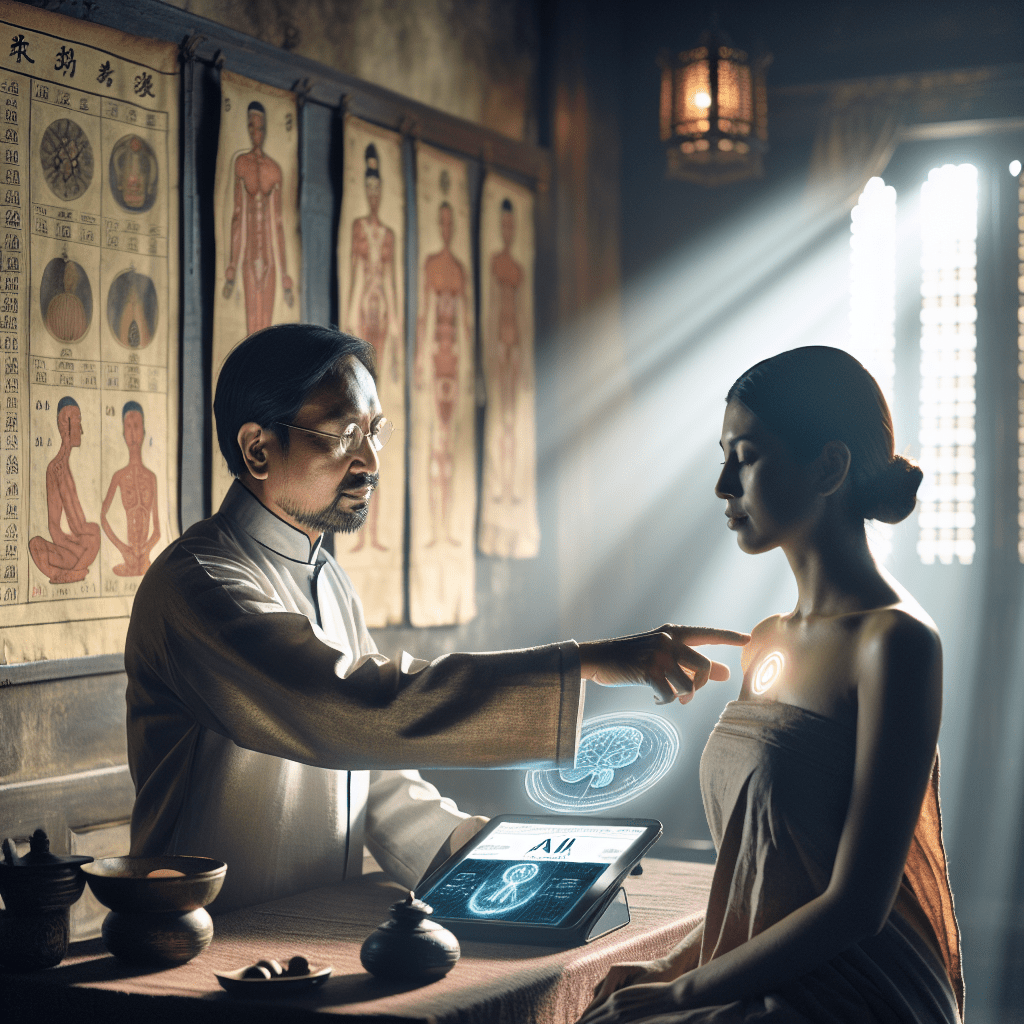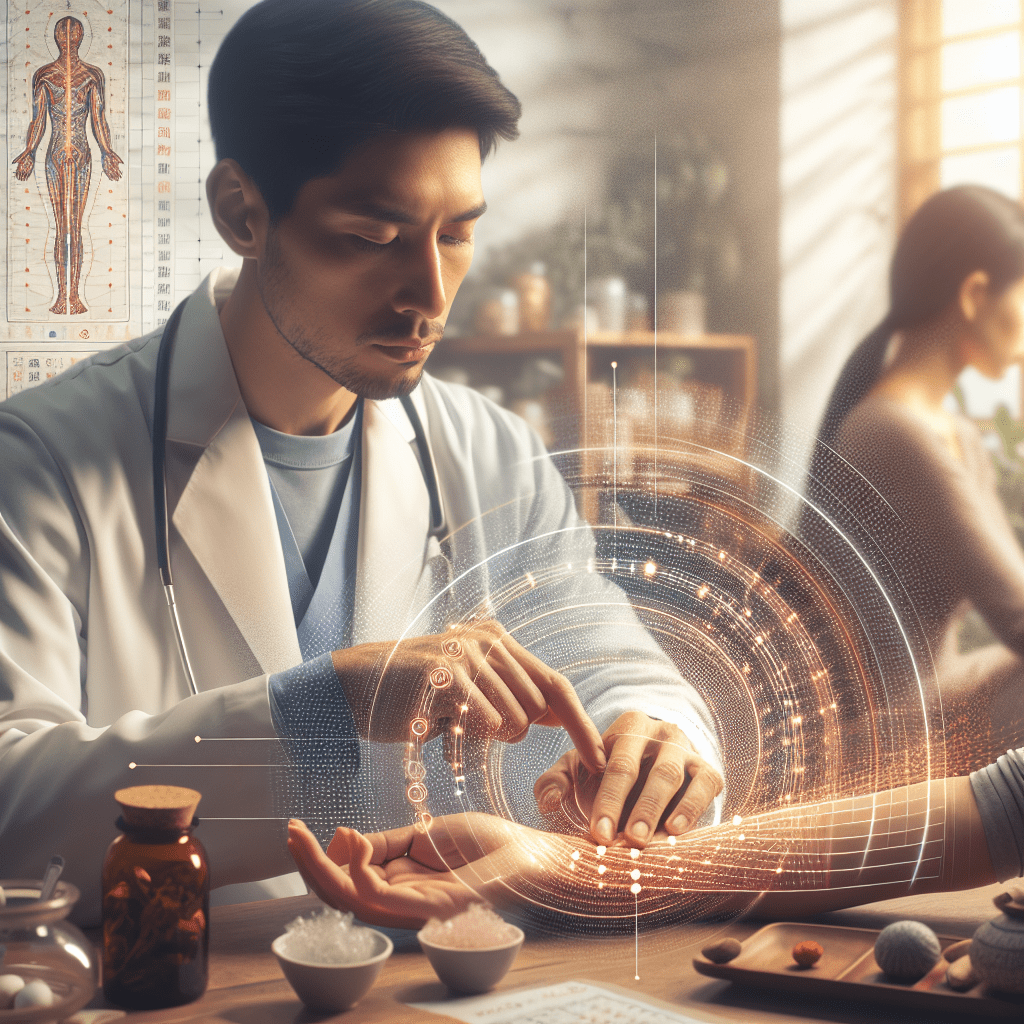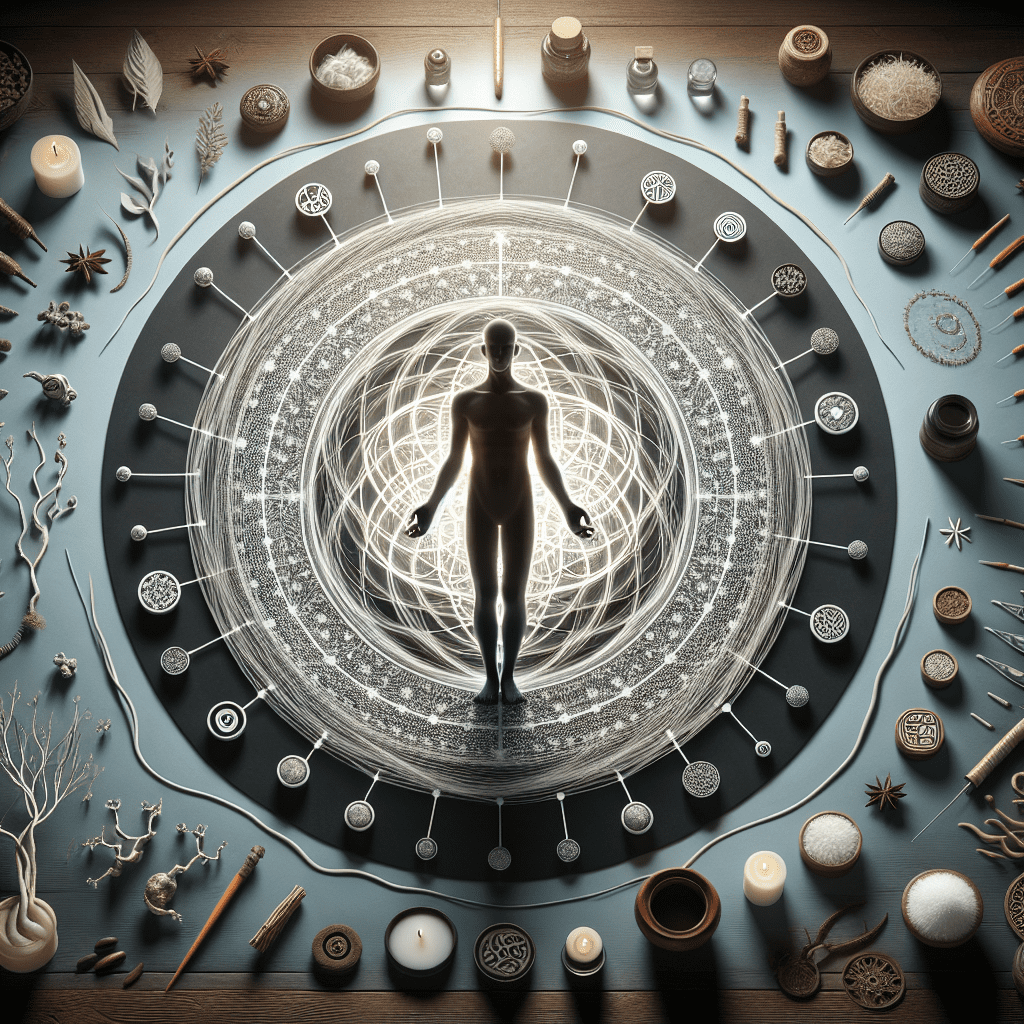Imagine a world where the ancient wisdom of Eastern healing traditions meets the cutting-edge capabilities of artificial intelligence. This isn’t science fiction—it’s happening right now, and it’s transforming how we approach health and wellness. AI in traditional medicine represents one of the most exciting frontiers in healthcare today, blending time-tested healing philosophies with modern technological innovation.
For thousands of years, traditional Eastern medicine has emphasized balance, prevention, and treating the whole person rather than just symptoms. These approaches have often been viewed as separate from—or even at odds with—modern Western medical science. But what if technology could help bridge this gap, enhancing ancient practices rather than replacing them?
The interest in holistic health approaches has exploded in recent years, with more people seeking natural solutions to complex health challenges. At the same time, AI technology has advanced by leaps and bounds. This perfect storm creates an unprecedented opportunity to revolutionize personal health journeys through a thoughtful fusion of Eastern wisdom and new technology.
Enhancing Diagnostic Accuracy with AI’s Pattern Recognition
One of the most promising applications of AI in traditional medicine is its ability to dramatically improve diagnostic accuracy. Eastern medical traditions like Traditional Chinese Medicine (TCM) rely heavily on subtle diagnostic observations—the color of the tongue, the quality of the pulse, facial features, and other indicators that require years of training to interpret correctly.
AI systems can analyze vast amounts of data from these traditional diagnostic methods, identifying patterns that might escape even the most experienced practitioners. For example, machine learning algorithms have achieved over 99% accuracy in identifying herbal medicines and classifying symptoms in TCM, significantly improving diagnostic efficiency.
“The subtle patterns in pulse diagnosis that might take a TCM practitioner decades to master can now be analyzed with remarkable precision using AI,” explains Dr. Lin Chen, a researcher in AI applications for Eastern medicine. “This doesn’t replace the practitioner—it enhances their capabilities.”
This enhancement is particularly valuable for complex and chronic conditions where traditional medicine often excels. Conditions like autoimmune disorders, digestive issues, and hormonal imbalances frequently present with clusters of seemingly unrelated symptoms. AI can help connect these dots, integrating traditional diagnostic wisdom with modern pattern recognition to create more accurate and comprehensive health pictures.
Personalizing Treatment Through Ancient Wisdom and Modern Technology
Personalization sits at the heart of both traditional Eastern medicine and modern AI applications. Eastern healing traditions have always emphasized that no two people are alike—treatment must be tailored to the individual’s unique constitution and circumstances.
AI in traditional medicine takes this personalization to new heights by integrating frameworks like the Five Element Theory with sophisticated algorithms. This ancient theory, which categorizes people according to Wood, Fire, Earth, Metal, and Water elements, provides insights into constitutional tendencies and imbalances.
EASTCHI AI, developed by HerbalsZen, exemplifies this approach by analyzing a person’s elemental constitution and then developing customized nutrition plans and lifestyle recommendations. The system learns from each interaction, continually refining its understanding of how specific individuals respond to different interventions.
“What’s revolutionary about this approach is how AI can process thousands of variables simultaneously,” notes Maya Williams, a holistic health practitioner. “It can consider your constitutional type, current symptoms, seasonal influences, and dietary preferences all at once—something that traditionally required extensive one-on-one consultation.”
This personalization extends to herbal formulations as well. Rather than one-size-fits-all approaches, AI can help determine the optimal combination of herbs for an individual’s specific condition, considering potential interactions and adjusting dosages with precision.
Predicting Health Outcomes: AI’s Crystal Ball
Perhaps one of the most valuable contributions AI brings to traditional medicine is its predictive capabilities. By analyzing patterns across large populations while simultaneously tracking individual responses, AI systems can forecast health outcomes with increasing accuracy.
Consider a patient with seasonal allergies who follows an Eastern medicine approach. AI in traditional medicine can predict flare-ups based on weather patterns, pollen counts, and the patient’s constitutional tendencies. It might recommend preemptive dietary adjustments or herbal preparations weeks before symptoms would typically appear.
Take Sarah’s experience with EASTCHI AI, for instance. “The system predicted I would experience digestive difficulties during the transition to fall based on my Metal element constitution,” she shares. “It recommended specific foods and herbs to strengthen my system before any symptoms appeared. For the first time in years, I sailed through autumn without the usual digestive troubles.”
This predictive capability aligns perfectly with traditional Eastern medicine’s emphasis on prevention. As the ancient Chinese proverb states, “The superior doctor prevents sickness; the mediocre doctor attends to impending sickness; the inferior doctor treats actual sickness.” This preventive approach forms the foundation of seasonal health cycles in Eastern medicine.
Continuous Monitoring and Feedback Loops
Traditional Eastern medicine has always emphasized the importance of adjusting treatments based on the body’s responses. In the past, this required frequent visits to practitioners. Now, AI in traditional medicine creates sophisticated feedback loops that enable continuous monitoring and adjustment.
Wearable devices, smartphone apps, and other monitoring tools can track relevant health markers and symptoms, feeding this information into AI systems that interpret the data through the lens of Eastern medical principles. The system then provides recommendations for adjustments to herbal formulations, dietary changes, or lifestyle modifications.
“What makes this approach uniquely powerful is how it considers the whole person,” explains Dr. James Wong, a specialist in integrative medicine. “AI doesn’t just track physical symptoms but can also incorporate information about sleep quality, stress levels, emotional states, and environmental factors—all crucial elements in Eastern healing traditions.”
This comprehensive monitoring aligns perfectly with traditional medicine’s holistic view that emotional, environmental, and physical factors are interconnected aspects of health. By creating these continuous feedback loops, AI helps traditional approaches become more responsive and precise.
Advancing Research and New Discoveries
Traditional medicine contains a wealth of knowledge about natural remedies that has accumulated over thousands of years. However, scientifically validating these approaches has often been challenging. AI in traditional medicine is changing this landscape, accelerating research and enabling new discoveries.
AI algorithms can screen hundreds of natural compounds from traditional pharmacopeias, identifying those with the highest potential for treating specific conditions. This process, which might take researchers years to complete manually, can be accomplished in weeks or even days with advanced computing.
One exciting example comes from research using AI to screen traditional herbal remedies for their potential in treating neglected tropical diseases. The AI system identified several compounds from traditional medicine that showed promise against these conditions, opening new avenues for treatment development. Research from national health institutions confirms AI’s ability to bridge ancient wisdom with modern innovation in TCM.
Furthermore, AI can help establish evidence for traditional practices by analyzing outcomes across large patient populations. When thousands of cases show consistent improvement following specific traditional interventions, this builds a compelling case for effectiveness, even if the exact mechanisms aren’t fully understood by Western scientific standards.
Integrating Eastern Wisdom with Western Technology
Perhaps the most profound impact of AI in traditional medicine is its ability to create bridges between Eastern healing wisdom and modern technology. Rather than forcing patients to choose between traditional approaches and modern medicine, AI enables a more integrated approach.
HerbalsZen’s EASTCHI AI platform exemplifies this integration by combining 2,000-year-old Eastern medical theories with cutting-edge AI capabilities. The system respects traditional frameworks like seasonal dietary guidance and the concept of food as medicine while enhancing these approaches with modern data analysis.
“What’s remarkable about this fusion is how it preserves the essence of traditional wisdom while making it more accessible and precise,” notes Dr. Elena Park, a specialist in integrative health. “The AI doesn’t replace the philosophical underpinnings of Eastern medicine—it illuminates them and helps apply them more effectively in modern contexts.” This approach aligns with recent scientific findings on integrating TCM with artificial intelligence.
This integration helps address one of the most significant challenges in healthcare today: the fragmentation of approaches. Patients often receive contradictory advice from different health systems. AI in traditional medicine can help identify complementary approaches and potential conflicts, creating more coherent health strategies.
The Future Landscape: Innovation and Improved Outcomes
Looking ahead, the future of AI in traditional medicine holds tremendous promise. As these technologies continue to evolve, we can anticipate several exciting developments.
First, we’re likely to see increasingly sophisticated diagnostic tools that combine traditional observations with modern biometric measurements. Imagine a system that integrates tongue diagnosis from traditional medicine with advanced blood biomarkers, creating a more comprehensive health assessment than either approach could provide alone.
Second, treatment personalization will become even more refined. AI systems will develop increasingly nuanced understandings of how different constitutional types respond to various interventions, creating highly individualized protocols that maximize effectiveness while minimizing side effects.
Third, we’ll likely see new herbal formulations and therapeutic approaches emerge from this fusion. By analyzing vast datasets of traditional knowledge through modern computational methods, researchers may identify powerful combinations and applications that weren’t previously recognized.
“The most exciting aspect of this evolution is how it might transform our fundamental understanding of health,” suggests Dr. Michael Chen, a researcher in integrative medicine. “Eastern medicine has always viewed health as a state of dynamic balance rather than merely the absence of disease. AI helps us quantify and track these balances in ways that could revolutionize preventive care.”
Democratizing Access to Eastern Healing Wisdom
Perhaps the most profound impact of AI in traditional medicine will be its ability to democratize access to Eastern healing wisdom. Traditionally, receiving personalized guidance in Eastern medicine required access to highly trained practitioners—a resource not available to many people, especially in remote areas.
AI platforms like EASTCHI can bring sophisticated traditional medicine guidance to anyone with internet access. This democratization helps preserve and propagate ancient healing traditions that might otherwise become increasingly rare in our modern world.
For individuals living in areas without access to traditional medicine practitioners, AI provides a bridge to this valuable knowledge. While not replacing the human touch of an experienced healer, these AI systems can offer meaningful guidance based on Eastern principles that would otherwise be completely inaccessible. This democratization aligns with findings from machine learning research trends in Traditional Chinese Medicine.
As we stand at this fascinating intersection of ancient wisdom and cutting-edge technology, one thing becomes clear: the fusion of AI and traditional medicine isn’t about replacing old with new. Instead, it’s about enhancing timeless healing wisdom with modern tools, making these approaches more precise, accessible, and effective than ever before.
By embracing this thoughtful integration, we open new possibilities for our personal health journeys—ones that honor the wisdom of the past while leveraging the technological marvels of the present. The result may well be a healthcare approach that is truly greater than the sum of its parts, offering the best of both worlds to support our wellbeing in the complex landscape of modern life.




